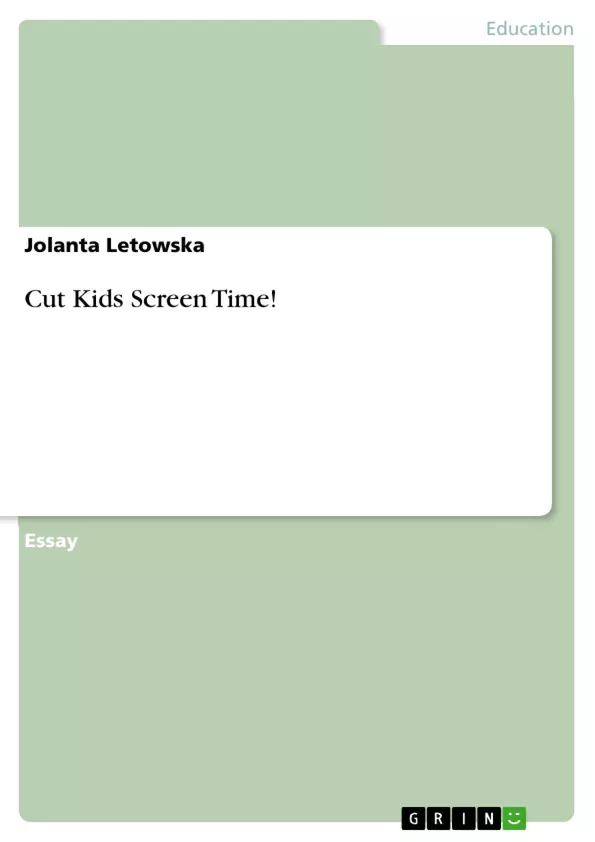The first two years of life are especially important in the growth and development of any child’s brain. During this time, children need good, positive interaction with other children and adults to develop good language and social skills. Learning to talk and play with others is far more important than watching television. Parents should stop using television as a babysitter. If parents need free time for themselves to read magazine or when moms need a free hand to get a laundry from a dryer is much better to record a story read by them, and then play those recordings for their children, instead of seating them in from of a screen.
Inhaltsverzeichnis (Table of Contents)
- Cut Kids Screen Time
- Importance of Early Childhood Development
- The Impact of Television Advertising
- Violence on Television and Its Effects
- Monitoring Screen Time and Providing Alternatives
Zielsetzung und Themenschwerpunkte (Objectives and Key Themes)
This text aims to highlight the negative effects of excessive screen time on children, particularly during their formative years. It argues that reducing screen time is crucial for healthy development, emphasizing the importance of real-life experiences and interactions.
- The detrimental impact of excessive television viewing on children's development
- The influence of television advertising on children's consumer behavior and potential health risks
- The correlation between exposure to violent content on television and increased aggression in children
- The importance of parental involvement in monitoring screen time and providing alternative activities
- The need for a balanced approach to media consumption in childhood
Zusammenfassung der Kapitel (Chapter Summaries)
The text begins by presenting research findings that suggest excessive screen time, particularly television, during early childhood can have negative long-term effects on language development, physical health, and behavior. It emphasizes the importance of real-life interactions for brain development during the first two years of life.
The text then delves into the impact of television advertising on children, highlighting the manipulative nature of advertising targeted at young audiences. Research suggests that children are susceptible to product preferences and requests influenced by advertising exposure, potentially leading to unhealthy consumption habits.
The text further examines the link between exposure to violent content on television and increased aggression in children. Research findings indicate a strong correlation between viewing violent television shows and aggressive behavior, both in childhood and later in life. The text emphasizes the importance of parental guidance and monitoring of television content to minimize potential negative influences.
The text concludes by advocating for parental involvement in monitoring screen time and providing alternative activities for children. It suggests that reducing screen time to a manageable level can have a positive impact on the growing generation, fostering healthy development and promoting a balanced approach to media consumption.
Schlüsselwörter (Keywords)
Key terms and concepts explored in this text include screen time, early childhood development, television advertising, violent content, aggression, parental involvement, and media consumption.
Frequently Asked Questions
Why is screen time particularly harmful for children under two?
The first two years are critical for brain development. Children at this age need real-life social interaction and play to develop language and social skills, which television cannot provide.
How does television advertising influence children?
Advertising targeted at children is manipulative and can lead to unhealthy product preferences and consumption habits early in life.
Is there a link between TV violence and child behavior?
Yes, research indicates a strong correlation between viewing violent content on television and increased aggressive behavior in both childhood and later life.
What can parents do instead of using the TV as a babysitter?
Parents can provide alternative activities like reading, playing together, or even playing audio recordings of themselves reading stories if they need a free hand.
What is the goal of monitoring a child's media consumption?
The goal is to ensure a balanced approach to media, fostering healthy physical and psychological development through more active and social experiences.
- Citar trabajo
- Jolanta Letowska (Autor), 2011, Cut Kids Screen Time!, Múnich, GRIN Verlag, https://www.grin.com/document/171171



